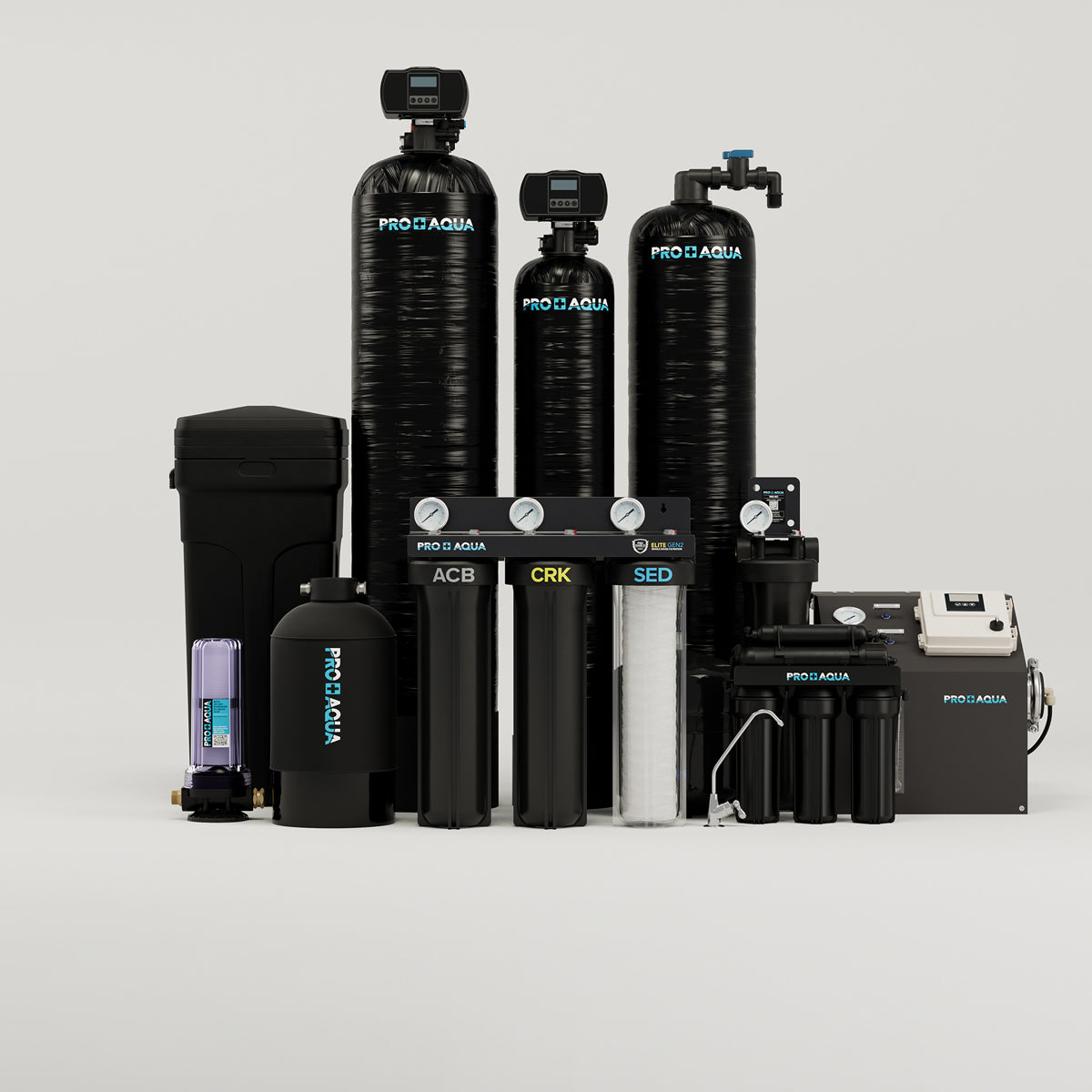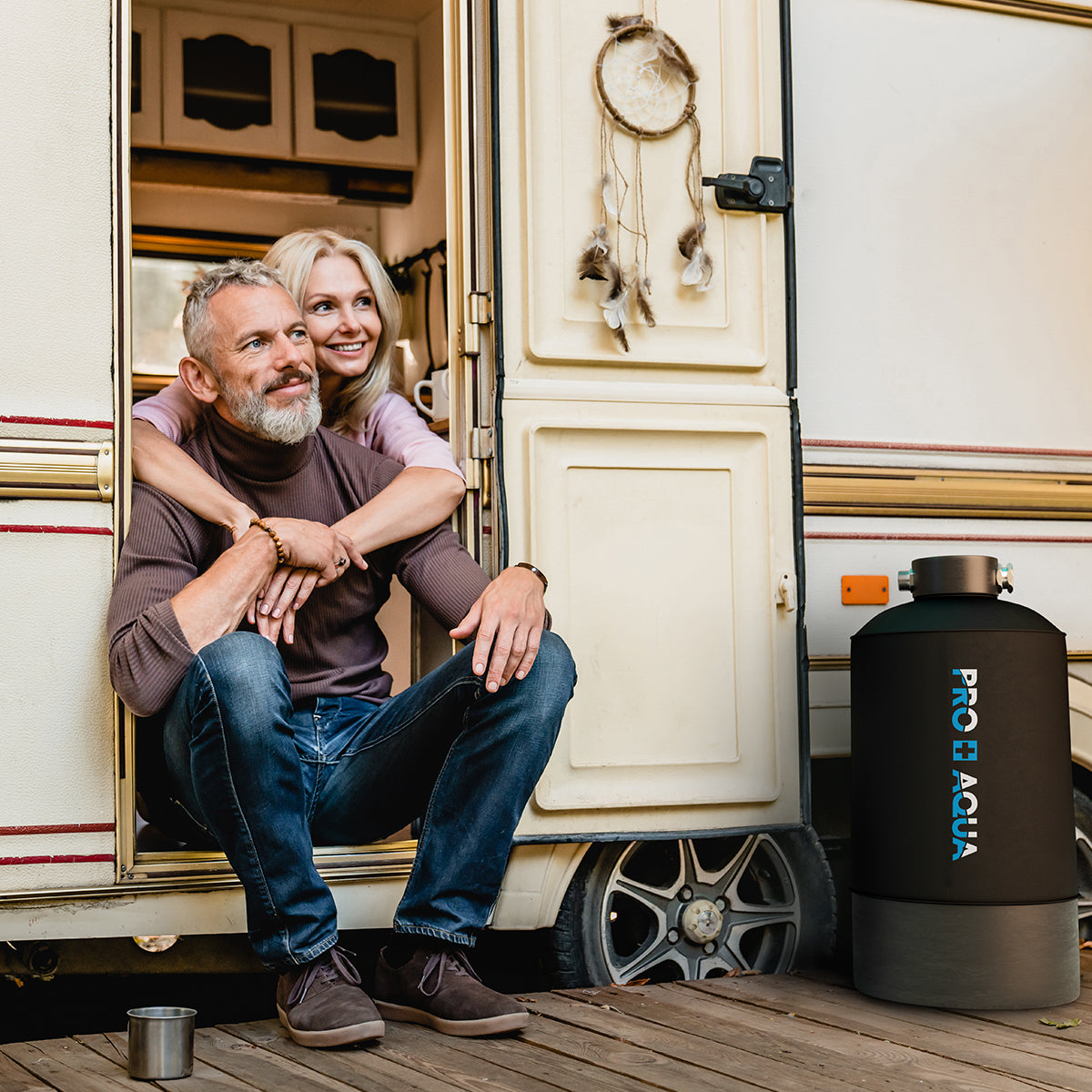Your water holds untapped potential. Minerals build scale in your pipes. Appliances work harder than necessary. Skin and hair feel the effects. It doesn’t have to be this way.
The solution? A salt-free water softener or a traditional salt-based system. Both tackle hard water, each in a unique way.
Understanding the difference helps you choose the system that best protects your home and investment.
The Hard Water Solution: Benefits of Soft Water Systems

Hard water affects 85% of American homes. Calcium and magnesium dissolve naturally as water passes through limestone and chalk. Safe to drink, these minerals still cause costly problems in pipes and appliances.
Scale builds inside pipes, restricting flow and raising pressure. Water heaters work up to 30% harder when scale coats heating elements. Dishwashers, washing machines, and coffee makers wear out faster. Energy bills rise steadily.
The signs are obvious. Soap scum coats shower doors. Spots appear on dishes. Laundry feels stiff. Hair looks dull. Skin stays dry. White mineral deposits return days after cleaning.
The Science Behind Salt-Based Water Softeners

Salt-based softeners are thorough and effective. They capture calcium and magnesium ions through ion exchange. Resin beads swap these minerals for sodium, leaving water genuinely soft.
Regeneration flushes captured minerals down the drain with salt brine. The result: genuinely soft water with minerals fully removed.
Pros and Cons of Salt-Based Water Softener Systems (AKA Water Softeners)
Throughout this guide, we'll refer to salt-based systems simply as water softeners. While water softeners are a great solution for many homes, there are some details to consider.
Pros of Water Softeners
- Complete mineral removal
- Handles extreme hardness
- Proven, time-tested technology
- Immediate, noticeable results throughout your home
Potential Cons
- Requires regular maintenance and salt refills
- Uses 50–100 gallons of water per regeneration cycle
- Restricted or banned in some regions
- Adds 20-30mg sodium per 8oz glass
Salt Bans: Legal Restrictions
If you're considering a water softener, location matters. Some states, including California, Texas, Michigan, and Connecticut, restrict softener use in certain areas. In these cases, a water conditioner delivers reliable results within its performance range.
Check local regulations before choosing a system that might not be permitted in your area.
Salt-Free Systems: Mineral Transformation Technology

Saltless water conditioner, water conditioner, and saltless water softener refer to the same type of system. All terms are all interchangeable and get used frequently across brands and water treatment literature. Throughout this blog, we'll refer to it as a water conditioner.
What is a Water Conditioner?
A water conditioner transforms minerals instead of removing them. Template-assisted crystallization changes the structure of calcium and magnesium. Hard minerals become microscopic crystals.
Calcium and magnesium remain, but lose their ability to form scale on surfaces. They flow through pipes harmlessly.
Your water keeps beneficial minerals, but scale formation stops. No salt. No chemicals. No backwashing. Just precise mineral conditioning that stops scale before it starts.
Pros and Cons of Water Conditioners
Water conditioners shine for households that want scale protection without the upkeep of salt or added chemicals. However, there are some limitations to water conditioners if you live in an area with extreme hardness.
Pros of Water Conditioners
- Zero ongoing maintenance costs
- Environmentally sustainable operation without the need for regeneration
- Preserves healthy minerals by transforming them instead of removing them
- Legal in all regions
- No sodium addition to water
- No slippery soft-water feeling
Potential Cons
- Does not soften water for healthier skin and hair
- Limited impact on soap lathering
- Doesn't work well for extreme water hardness levels
Water Conditioner vs. Water Softener: Core Differences

The distinction matters. It’s not about which system is better. Rather, which system’s technology will benefit your home the best.
Softener vs. Conditioner: What’s the Difference?
|
Feature |
Water Softener |
Water Conditioner |
|
Mineral Handling |
Removes completely |
Transforms structure |
|
Process |
Ion exchange with sodium |
Template-assisted crystallization |
|
Salt Required |
Yes (100-300 lbs/year) |
No |
|
Water Feel |
Slippery, soft |
Natural |
|
Maintenance |
Regular salt refills |
Minimal |
|
Backwash Cycle |
Yes (wastes water) |
No |
|
Environmental Impact |
Higher |
Lower |
|
Legal Restrictions |
Some regions ban them |
Legal everywhere |
Both systems prevent scale and protect your home. The right fit depends on your water and lifestyle.
Choosing the Right System for Your Home
When selecting a system to tackle hard water, think long term. Consider maintenance, water use, and environmental priorities when choosing the system that fits your home.
Test your water hardness first. The numbers guide your choice:
- Test water hardness: Above 25 grains, a softener is recommended; below that, either system works well.
- Check local regulations: If softeners are banned, a conditioner is your option.
- Consider your lifestyle: Do you prefer minimal maintenance with reliable scale prevention, or are you ready to maintain a softener for peak performance and the added benefits for hair, skin, and cleaning efficiency?
Whatever soft water system you choose, benefits reach every part of your home.
The PRO+SOFT Collection

PRO+AQUA's PRO+SOFT Water Systems deliver both options without compromise. Our water conditioners handle up to 25 grains of hardness with TAC precision. Traditional softeners in 32,000 to 80,000-grain capacities tackle the toughest water challenges.
Every component earns its place through measurable performance gains.
The Verdict
Whichever type of soft water system you choose, the benefits of soft water reach every inch of your household from softer skin to more efficient appliances. Choose PRO+AQUA for complete whole house protection.
Don't let scale and corrosion dictate your home's fate. Take control with Pro+Aqua now.
FAQs
Can water conditioners remove existing scale buildup?
Water conditioners prevent new scale formation but don't remove existing deposits. They'll gradually reduce old scale over time as water flow continues, but manual cleaning or professional descaling addresses existing buildup faster for immediate results.
Do water softeners make water taste salty?
Properly functioning water softeners add minimal sodium, about 12.5mg per 8oz glass with 10-grain hardness. Most people can't taste this slight increase. If water tastes salty, your system needs adjustment or repair immediately.
How long do water conditioners last?
Quality water conditioners operate 15-20 years with minimal maintenance. TAC media typically needs replacement every 5-7 years depending on water usage and hardness levels. The tank and housing last decades with proper installation.
Will a water softener reduce my water pressure?
Properly sized softeners maintain normal pressure. Pressure drops indicate undersized systems, clogged resin, or installation errors. PRO+AQUA systems are engineered to handle your home's flow rate without restricting water delivery or compromising performance.
Is pool salt the same as water softener salt?
No. Pool salt lacks the purity water softeners demand. It contains impurities that clog resin beads and destroy system efficiency. Water softener salt comes in three grades: rock, solar, and evaporated. Using pool salt voids warranties and guarantees expensive repairs.







Leave a comment
This site is protected by hCaptcha and the hCaptcha Privacy Policy and Terms of Service apply.